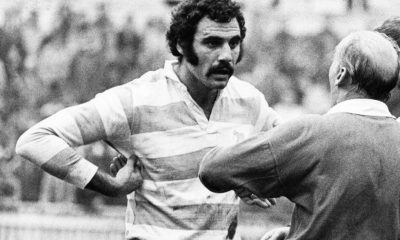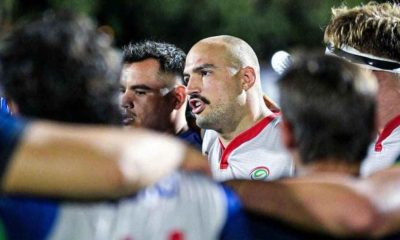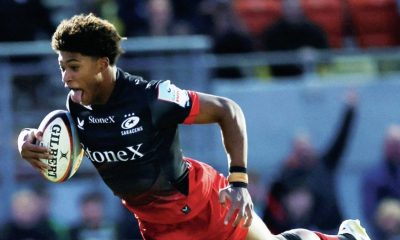 He looks and sounds like a London publican and certainly a job for life awaits on the EastEnders set should luvviedom ever appeal. But for the time-being George Chuter remains a professional rugby player. And not just any player. No player in history has played in more Premiership games than the enduring Chuter and at the Honourable Artillery Club in London last night the unassuming hooker was inducted to the Premiership Hall of Fame alongside the likes of Martin Johnson his former captain at Leicester, and Lewis Moody another Tigers legend.
He looks and sounds like a London publican and certainly a job for life awaits on the EastEnders set should luvviedom ever appeal. But for the time-being George Chuter remains a professional rugby player. And not just any player. No player in history has played in more Premiership games than the enduring Chuter and at the Honourable Artillery Club in London last night the unassuming hooker was inducted to the Premiership Hall of Fame alongside the likes of Martin Johnson his former captain at Leicester, and Lewis Moody another Tigers legend.
Some of these Hall of Fames that proliferate the sporting scene can grate a little, seeming a bit random and arbitrary, but I like the way the Premiership version disregards England caps and World Cup winners medals and places the emphasis on an individual’s contribution to their clubs and/or the Premiership. And in that respect Chuter is the top of the pile with his record 262 Premiership appearances. Injury permitting, Saracens skipper Steve Borthwick (256) will probably pass him some time later this season before he hangs up his boots, but apart from that, the nearest active player is Chris Jones who has logged 213 Premiership games for Sale and Worcester.
Chuter, 38 in July, is not one for trinkets and momentos – when pressed he admits he has no idea where his six Premiership medals are let alone the Tetley’s Cup tankard he won with Saracens in 1998 – but he is quietly chuffed with his Premiership career, a considerable body of work which stretches back to the dawn of professionalism with Saracens to the present day with Tigers. There is nothing in professional club rugby that Chuter hasn’t seen or done. His story is the story of professional rugby in this country. He has been involved in all five incarnations of the top flight – Courage League, Allied Dunbar, Guinness, Zurich and now the Aviva Premiership.
“I suppose if you’re an old buggar who’s been playing forever and doesn’t get injured much there is always a chance of setting a few appearance records,” he says in an unsuccessful effort to deflect praise. “It was never an aim or a target but one day somebody at the club pointed out that I had just gone top of the list. I won’t be there forever, Steve is catching up fast and some of the youngsters now will have long careers, but when I stop to think of the effort that has gone into my 17 years as a professional it’s an achievement I’m pretty proud of. Whether I deserve to be placed in a Hall of Fame alongside the likes of Johnno and Lewis Moody, well I’m not sure about that.”
The uncompromising, unflinching Chuter so epitomises the best of Leicester and that dogged rural hardness of Leicestershire and surrounding counties where they trawl for talent that you have to remind yourself of his impeccable London roots and that, by his own admission, he spent three seasons at Saracens “hating Leicester’s guts”. He always seemed to excel in those grudge matches against Leicester who possibly recognised one of their own ilk and certainly Tigers were quick to move at the end of 2000 to sign Chuter when the opportunity presented itself.
The Chuter story starts with a cricket mad Ian Botham wannabee at Trinity Whitgift Croydon discovering to his chagrin that he was actually better at rugby than his sport of choice. Almost reluctantly he started concentrating on rugby and was soon the regular hooker in various Surrey and London age group teams although England honours tended to elude him with Phil Greening and Neil McCarthy being preferred although he did sneak in one season and win an England Colts cap.
Still, Chuter was beginning to enjoy his rugby and drinking plenty of beer at Old Mid-Whitgiftians when his London U19 coach Mark Evans – yes that Mark Evans – suggested he drop in on Saracens summer training sessions in 1996. A relaxed Chuter took the offer on face value although it was in effect no less than a trial with a view to a pro contract
“I turned up at Bramley Road that first evening – professional rugby sides still trained in the evening then, most of the guys still had other jobs or commitments – and the first two people I bumped into in the crowded dressing room were Michael Lynagh and Philippe Sella. I was changing next to Michael and by pure chance my kit that night consisted of a Wallaby replica shirt my mum had bought in Debenhams me. That went down very well and then over in the corner Philippe was the heart and soul, a very boisterous and loud voice. I also soon discovered that he was the most professional and meticulous trainer I was to ever meet. There were lots of very good reasons why both he and Michael were legends, talent being one of them, but hard work and attention to detail was the thing that hit me between the eyes.
“Anyway I ran around for a month or so with them enjoying myself when Mark came up to me and said did I want to join for the 1996-97 season which was the first fully professional season in England. Without giving it any real thought I said yes and here I am 17 years later still at the coalface.
“Looking back I had the perfect introduction to professional rugby. Sarries had signed a raft of internationals and the result was that many of their starters from the season before were playing in the second fifteen with me – really good players like John Buckton and John Green. We used to have a fair few Anglo-Welsh Cup fixtures in midweek and second team games on the Saturday. I got on the bench for a few Courage League matches as well but didn’t play. There were no tactical replacements in those days, you only got on if there was an injury. No worries, there was plenty of rugby, the social side was absolutely no different from the amateur game except this time I had a few bob in my pocket. Happy Days really.”
Chuter made his breakthrough the following season when first choice hooker Greg Botterman underwent a groin operation and never looked back as a star-studded Saracens side marched to a spectacular Pilkington Cup victory at Twickenham after finishing second to Newcastle in the Allied Dunbar League. All look set fair for more success the following season but further big names signings made life difficult for Francois Pienaar in his player-coach role.
“Francois was brilliant for me, undoubtedly the most influential figure in my early career, but I think he found himself in the middle quite a bit that season with various people wanting different game plans. In coach terms he was a rookie and possibly made too much effort to accommodate everybody and if he had his time over again he might have done it differently. But on a personal level he was superb. Coming from South Africa, where honest professionalism had been a way of life for a good while, he showed me how I had to train and behave. I was getting wayward and a bit wild and he made me knuckle down and showed a lot of belief in my ability. I have a lot to thank him for.”
Even so, the young Chuter still wasn’t entirely sure about this professional rugby nonsense and in April 2000 he surprised colleagues and friends by announcing his intention of taking time out to travel which he duly did, going to the USA and spending a month in Australia, mainly in Sydney to take in the 2000 Olympics. Barely had he got off the plane back home in England than there was a firm contractual offer from Leicester.
“The spell off was no great drama, I was just feeling very stale and a bit lacking of motivation at the end of the season. I had played 48 games in all competitions in the 98-99 season and plenty the season after and needed a breather. Sydney was amazing, it’s a great city at the worst of times let alone when the Olympics are in town. I had a friend at the British Olympic Association who managed to get me poolside and trackside at quite a few big events.
“People assume it must have been the close proximity with such star athletes that inspired me and kick-started my rugby again but actually it was no more complicated than getting home and hearing Leicester Tigers wanted to sign me. That’s a pretty big incentive when you are a rugby player. I was bit overweight – my diet for six months was basically Pringles and beer – but I felt rested and good about life and within no time I was sitting opposite Dean Richards, my schoolboy hero, signing the deal. Lady Luck was looking after me again.”
So it was back to the day job and with a vengeance although the first job was to regain a semblance of fitness and for the first month or so he was kept apart from senior squad training and did endless laps and sprints under the supervision of conditioning coach John Duggan. And then it was back to the fray. Of course, being Leicester a first team place is never guaranteed and initially he was up against Dorian West and Richard Cockerill. Then came Deon Keyser now of Clermont and France, Wales Mefin Davies and, finally in the last few years, a supercharged Tom Youngs. It is the Leicester way and Chuter has always enjoyed the internal competition.
“It’s the whole environment that makes Leicester so consistent. There is this impression that it’s just a case of 30-40 Leicester mutes kicking lumps out of each other and trading punches in training matches every Tuesday and carrying that intensity and competition through to the games on Saturday. I can assure you it goes a bit deeper than that.
“Yes we have some ferocious old sessions but you can’t do that week in week out unless you are real mates. There is always great camaraderie and laughs at Leicester and quite a few beers when the time is right. I don’t see how you can be a successful team in the long term unless you enjoy each other’s company.
“No the batting order here is getting the right group of blokes together – who are tight and get on – then comes the intense training and then what you see on the pitch every Saturday. There is no magic formula but you do sense a dedication to the cause that goes back 130 years or more. It’s in the club’s DNA. We might play in the city but at heart this club is rural Leicestershire, tough farming people and those also from Norfolk and East Midlands.
“Every generation tries to improve on the previous one and the pedigree is right up there. When you play you are very aware of those who have gone before you and the standards that are expected.”
During Chuter’s long career at Welford Road – often as a starter, sometimes on the bench and occasionally sitting in the stands – Leicester have won the title on six occasions, a record of consistency that brooks no argument. During that time there were 24 England caps and an appearance on the bench in the 2007 World Cup Final, a Test record that demands respect, but Chuter’s genius had been performing week in, week out in one of the toughest physical leagues in the world.
Chuter is nothing if not old school and took a while to be convinced when the Premiership switched to the play-off system. “It was always going to divide opinion and for me the first past the post at the end of a long season with everybody playing home and away is the purest form of deciding a championship and obviously it’s still the way the football Premiers League does it.
“Having said that, although quite a few of us at Leicester weren’t happy at the switch the reality is that it has done us a few favours. With our Test players coming back from summer tour or Lions trips and a huge number of international calls every November, we have had some really tough autumns and have had to rely on finishing strong in the second half of the season to make sure of our place.
“Purely as a spectacle I suspect the rugby played in the Premiership ten years ago was better to watch – more fluid – but as a spectator I’ve always enjoyed the intense arm wrestles and battle of wills with big defences going to work so there have been plenty of Premiership matches recently I have enjoyed. As ever there is still a lot of debate about the scrum but let me tell you that was going on in 1997 as well. Physically rugby’s changed out of all recognition, though. I don’t remember too many Manu Tuilagis around in 1997, now every Premiership club seems to have two or three out there. It’s tough and getting tougher every season.”
























You must be logged in to post a comment Login